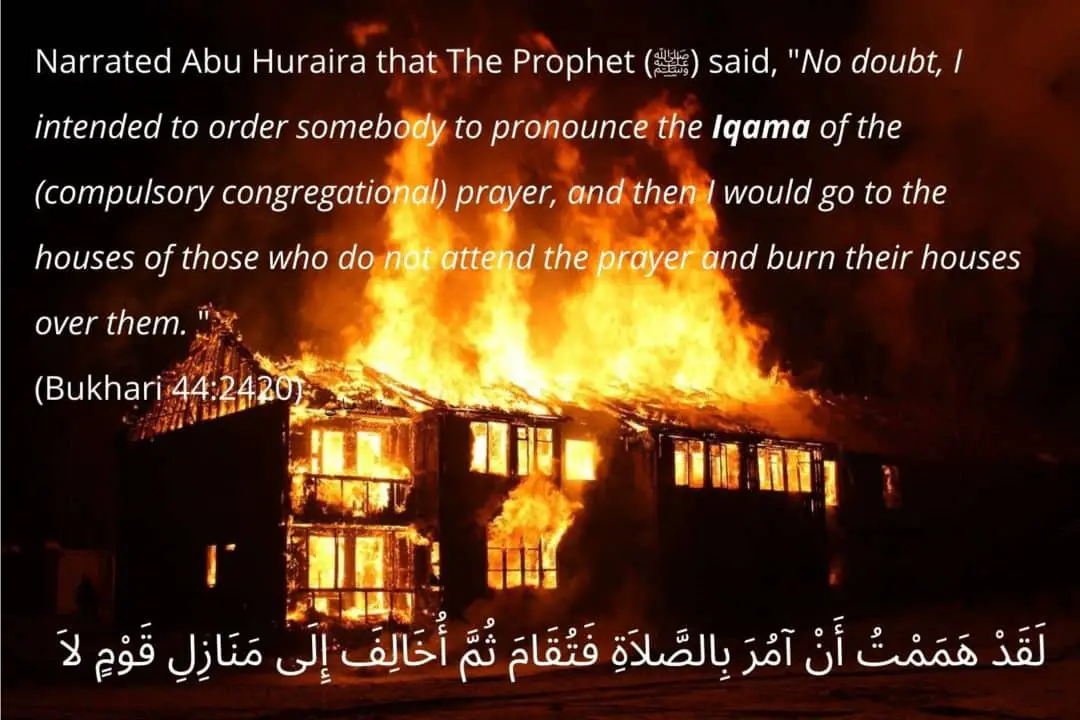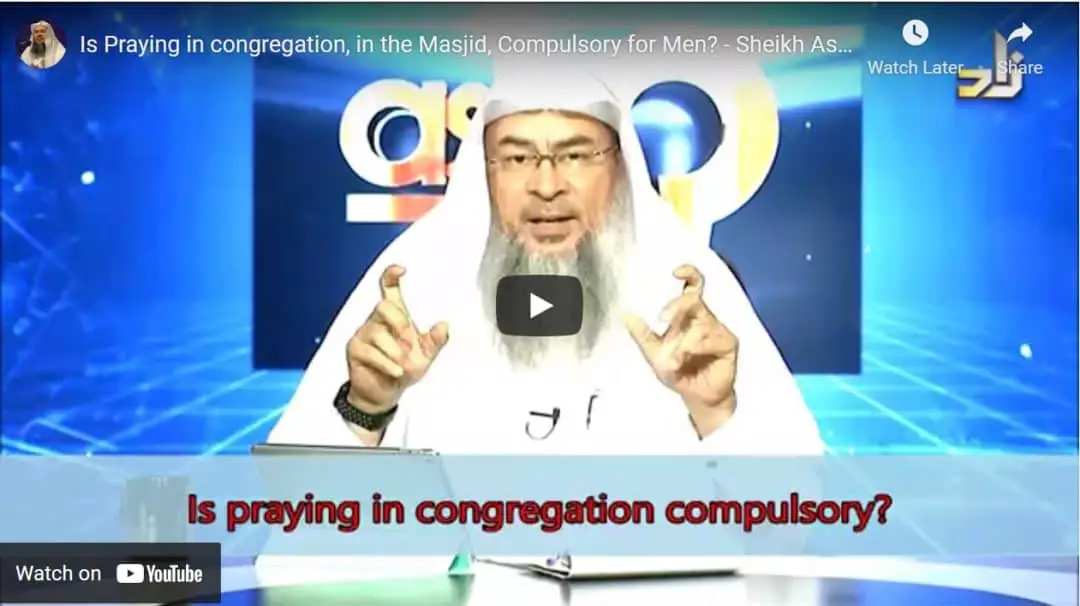I often wondered why some devout Muslims immediately hasten to the Masjid to offer the five obligatory prayers when they hear the call to prayer (Adhan).
However, many others prefer to do their daily prayers while at school, college, work, or in the comfort of their own homes.
We all know that we must perform ALL the five prayers (Fard Al-Ayn) daily. The act of praying (As-Salat) distinguishes believers (Mumineen) from non-believers (Kuffar).
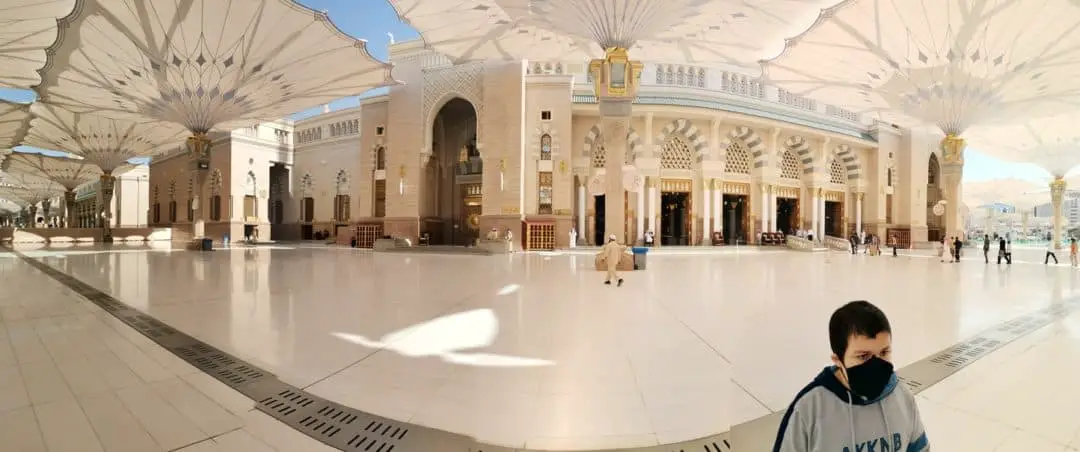
On the day of resurrection, the first thing Allah (SWT) will ask us about is our prayers. Also, not praying is the fourth major sin in Islam.
But, I was unsure if Islam obliges us to do them in congregation in a mosque (Salat Al-Jama’ah) or if we are permitted to do our prayers alone in a place of our choice.
So, I decided to research the matter. I reached out to various scholars and consulted Islamic texts and rulings. The following is what I found out.
So, Should Muslims Pray All 5 Prayers In The Mosque?
If you can hear the call to prayer (Adhan), Islam requires all Muslim men to offer the five daily prayers (Salat) in a mosque. However, it exempts the sick, travelers, women, and those far away from a mosque. Scholars claim it is reprehensible, hypocritical, and sinful not to pray in a congregation.
So, is it compulsory for Muslims to pray in a congregation in a mosque, or is it just highly recommended?
Obligation To Pray In The Mosque-Two Major Opinions

Two main groups of scholars hold the following opinions regarding the obligation for Muslims to pray the five obligatory prayers (As-Salat) in the mosque.
1. Collective Obligation (Fard Kifiyah)
In effect, Fard Kifiyah is an obligation on a group of (legally competent) individuals (Mukallafeen) who must meet the obligation. The remaining people are exempt.
is an obligation on a group of (legally competent) individuals (Mukallafeen) who must meet the obligation. The remaining people are exempt.
In relation to compulsory prayers (As-Salat), this group of scholars argues that since the collective obligation to attend prayer was met by some Muslims, there is no compulsion for everyone to fulfill it.
Some examples are Jihad, Janaza Prayers, burials, constructing mosques and hospitals, performing Ijtihad, etc.
In this case, scholars argue that Islam highly encourages everyone to attend congregational prayers, but it is not a must.
2. Individual Obligation (Fard Al-Ayn)
In effect, Fard Al-Ayn is an obligation that every individual should perform. No one else can do this duty on behalf of someone else. These include the five daily prayers (As-Salat), fasting (As Siyam), almsgiving (Zakat), etc.
is an obligation that every individual should perform. No one else can do this duty on behalf of someone else. These include the five daily prayers (As-Salat), fasting (As Siyam), almsgiving (Zakat), etc.
Conversely, this second group of scholars believes that congregational prayers in mosques are mandatory for every individual Muslim man. In practice, he should offer all the five prayers in a mosque and in a congregation.
However, some individuals are exempt from this obligation. These include the sick, infirm, women, and those who live or work far from mosques or formal places of prayer.
For example, women may have children and other household duties to perform and will not always be free to attend the mosque for all the five prayers. Also, some workers cannot leave their place of work when on duty.
Others work or live far away from the mosque, so attending the five prayer sessions would present a logistical burden for them.
In these cases, scholars argue that Islam permits Muslims to offer their prayers at their place of study, work, or home. However, for the rest of us, we should go to the mosque for all the 5 daily prayers.
Which Evidence Supports The Fard Al Kifiyah View?
Scholars and commentators who claim that Muslims are NOT obliged to pray in a congregation in a mosque, do accept that all Muslims must attend the weekly Friday congregational prayer. (Salat- Al Jumaa).
They also acknowledge that joining others in groups for Salat is 27 times more rewarding than praying alone . They believe it is beneficial for Muslims to pray in a congregation since it unites people and strengthens community ties.
. They believe it is beneficial for Muslims to pray in a congregation since it unites people and strengthens community ties.
For evidence, they use the following two Hadith.
1. Prophet Mohammed (SAW) – Muslims Can Pray At Home
In a famous Hadith, Ibn Umar states that Prophet Mohammed (SAW) instructed people to offer prayers at home and not take their houses as graves.
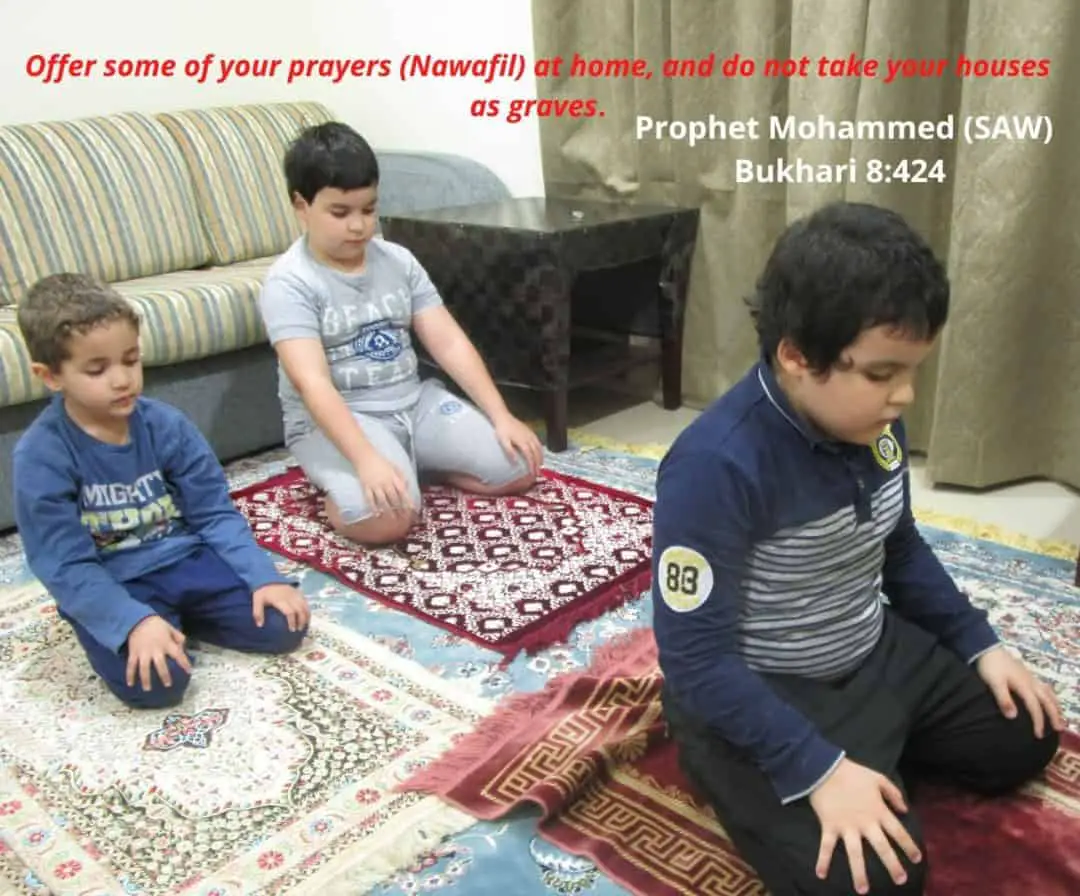

Narrated Ibn Omar reports that:
The Prophet (SAW) had said, Offer some of your prayers (Nawafil) at home, and do not take your houses as graves.
Bukhari 8-Volume 1, Book 8, Number 424
To be clear, this Hadith only refers to offering Sunnah prayers at home and NOT the obligatory five prayers,
2. Prophet Mohammed (SAW) – Muslims Can Pray Anywhere
Another Hadith states that Prophet Mohammed (SAW) said that the entire earth is a Masjid.
states that Prophet Mohammed (SAW) said that the entire earth is a Masjid.


They understand from the above Hadith that Muslims can pray in any place on the earth as long as it is clean and not a graveyard.
However, they should avoid praying in prohibited places such as graveyards, rubbish dumps, toilets, or bathrooms. And, they regard almost any location as acceptable for offering obligatory prayers as soon as they are due.
Some scholars and Muslims use the two above Hadith and others as proof that it is permissible for Muslims to offer their five obligatory prayers (Salat) at home or any other place they like.
What Evidence Supports The Fard Al-Ayn View?
Scholars who regard praying the five obligatory prayers (Fard al-Ayn) in the Masjid argue that every Muslim man must offer ALL the five prayers in a mosque in a congregation.
Those exempted are women, the sick, the infirm, travelers, and those who live, study, or work far away from a mosque or place of worship.
Of the two, most Muslims agree that the Fard Al-Ayn viewpoint is correct.
The evidence for this viewpoint is based principally on a Surah Al Nisa 4:102 .
.
Evidence From the Quran
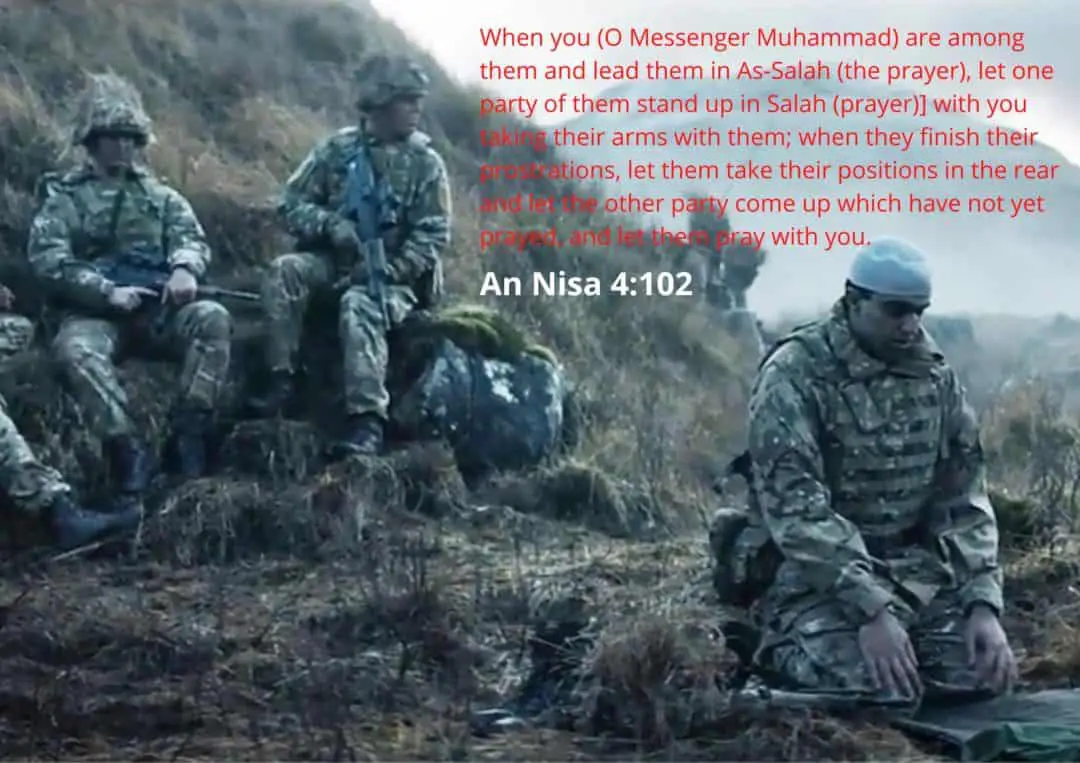

1. Allah (SWT) Commands Prophet Mohammed (SAW) To Pray With Two Groups
In Al Nisa 4:102, Allah (SWT) addresses Prophet Mohammed (SAW). He tells the Prophet to pray with one group of Muslims bearing arms and let the other group keep watch.
Allah (SWT) addresses Prophet Mohammed (SAW). He tells the Prophet to pray with one group of Muslims bearing arms and let the other group keep watch.
After they have finished, the second armed group keeping watch should also pray in a congregation following the first.
Since Allah (SWT) commanded BOTH groups to pray in congregation in Al Nisa 4:102 , scholars reason that the five obligatory prayers (As-Salat) are not Fard Kifiyah.
, scholars reason that the five obligatory prayers (As-Salat) are not Fard Kifiyah.
The Quranic verse indicates that every Muslim man is individually obliged to offer it as a Fard Al-Ayn.
indicates that every Muslim man is individually obliged to offer it as a Fard Al-Ayn.
In the following YouTube video, Shaikh Mohammed breaks down this verse (Al Nisa 4:102 ), and reasons to show how congregational prayers for men are obligatory.
), and reasons to show how congregational prayers for men are obligatory.
2. Allah (SWT) Commands Muslims To Pray With Others
In another short verse , Allah (SWT) commands Muslims to bow down with those who bow down.
, Allah (SWT) commands Muslims to bow down with those who bow down.
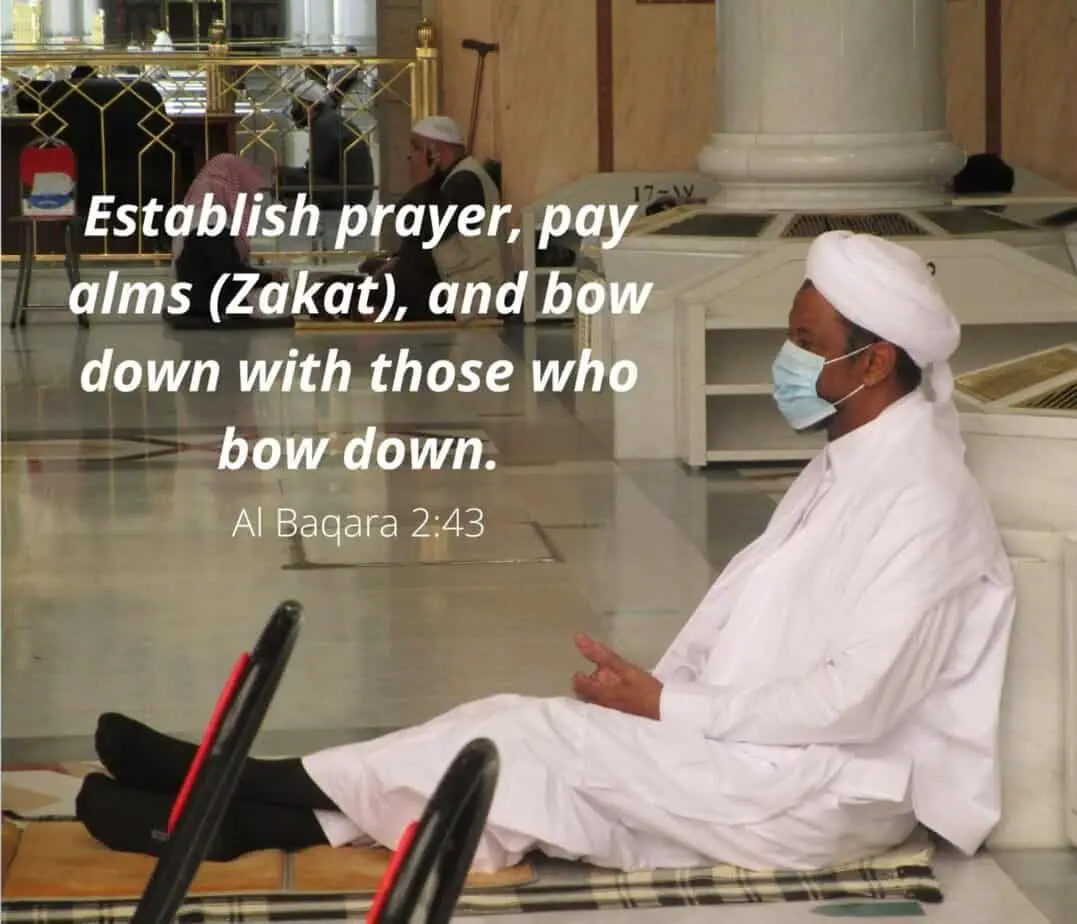

Likewise, Allah (SWT) gives similar instructions to Maryam in Surah Al Imran 3:43
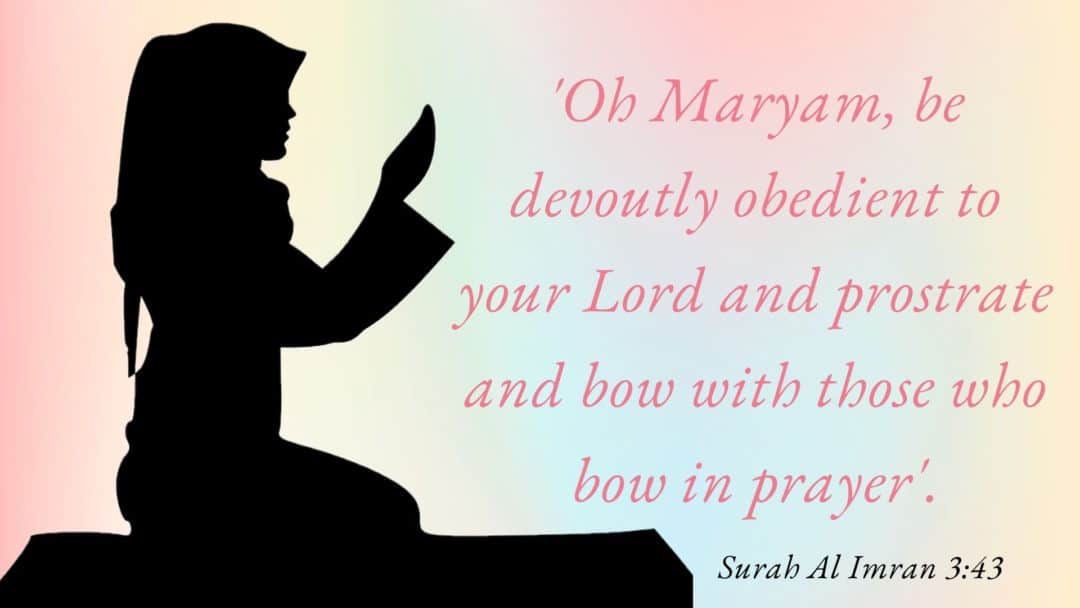

In both verses, Allah (SWT) commands believers to pray in a congregation and establish it as Fard Al-Ayn.
Evidence From Hadith
1. Burn Down Their Houses -Prophet Mohammed (SAW)
In a Hadith in Al Bukhari 4: 2420 , Prophet Mohammed (SAW) comments on how he wanted to set fire to the houses of the men who did not come to the Masjid to offer prayer in the congregation.
, Prophet Mohammed (SAW) comments on how he wanted to set fire to the houses of the men who did not come to the Masjid to offer prayer in the congregation.
Regarding this Hadith , proponents of the Fard Kifiyah viewpoint argue that it refers only to the Friday prayer (Salat Al Jumaa). They say that Prophet Mohammed (SAW) did not intend the comment to apply to five daily prayers in the mosque.
, proponents of the Fard Kifiyah viewpoint argue that it refers only to the Friday prayer (Salat Al Jumaa). They say that Prophet Mohammed (SAW) did not intend the comment to apply to five daily prayers in the mosque.
However, the Hadith shows Prophet Mohammed’s (SAW) strength of feeling on the matter.
2. Hypocrites Find Two Prayers To Be The Most Difficult – Al Fajr & Al Isha
In another Hadith , Prophet Mohammed (SAW) says that hypocrites find two prayers burdensome and would crawl on their hands and knees to the Masjid if they understood the benefits they get by attending these prayers.
, Prophet Mohammed (SAW) says that hypocrites find two prayers burdensome and would crawl on their hands and knees to the Masjid if they understood the benefits they get by attending these prayers.
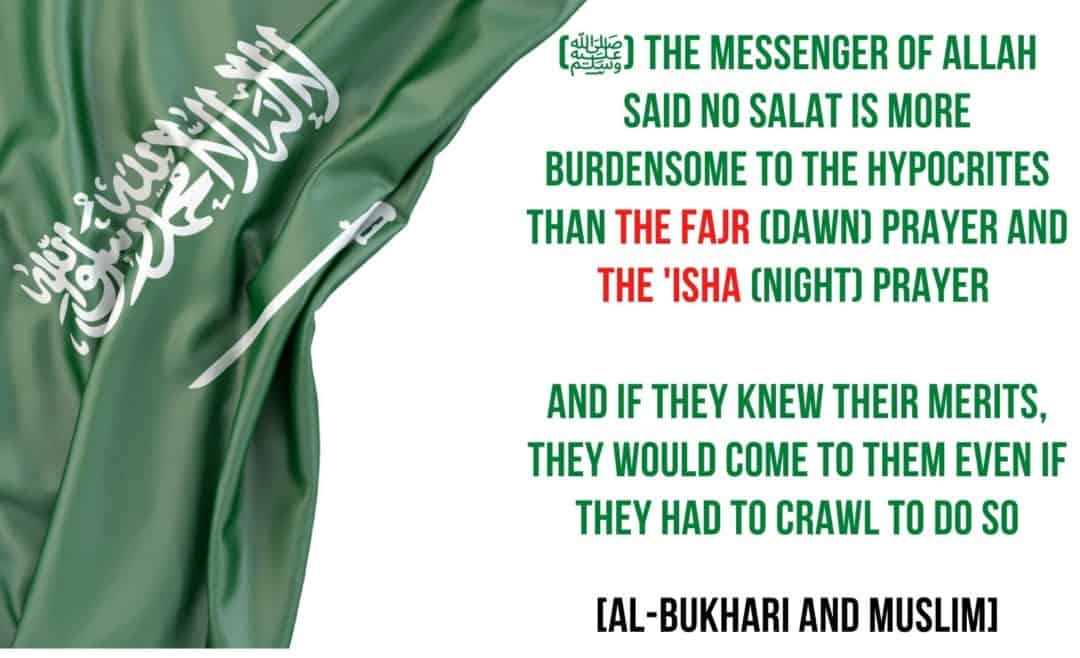

2. A Blind Man MUST Attend The Five Prayers In A Congregation
In another Hadith, a blind man Abdullah Ibn Um Maktum asks Prophet Mohammed (SAW) to excuse him from attending obligatory prayers in the mosque because he does not have a guide to take him.
a blind man Abdullah Ibn Um Maktum asks Prophet Mohammed (SAW) to excuse him from attending obligatory prayers in the mosque because he does not have a guide to take him.
Prophet Mohammed (SAW) refuses him and replies the blind man should answer the call to the Adhan since he can hear it from his home.
Amr ibn Za’dah narrated that:
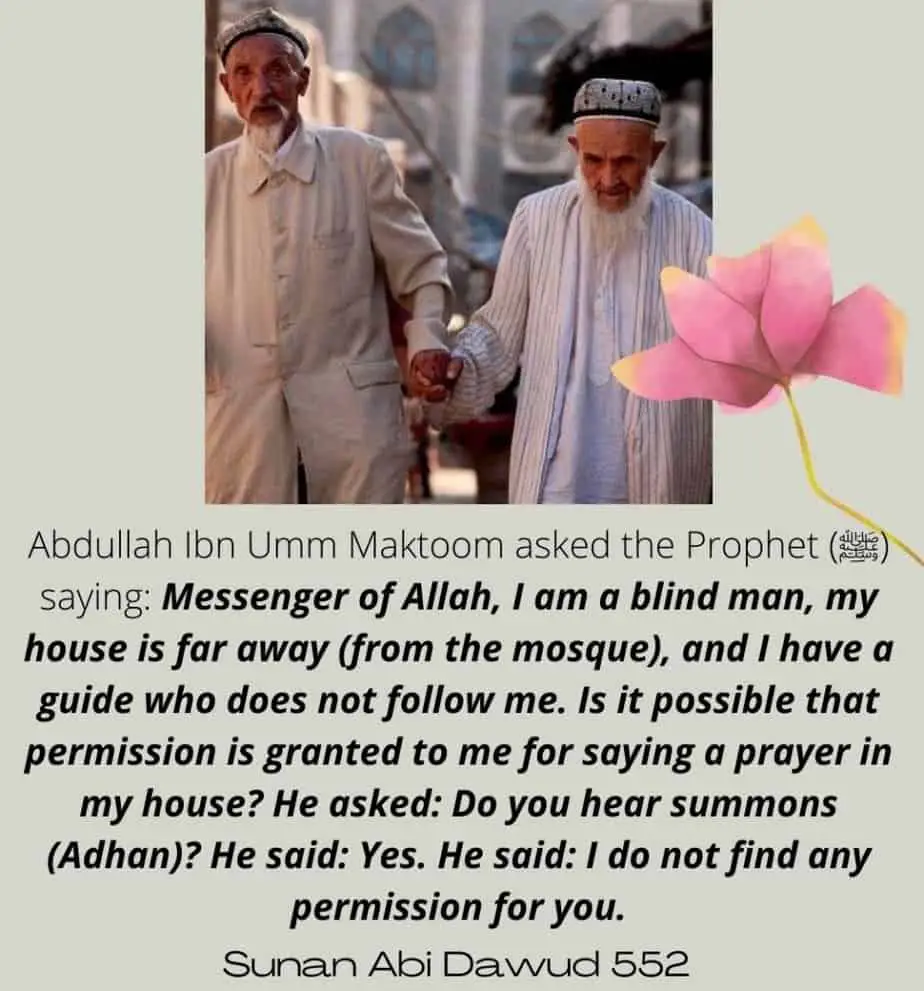

Shaikh Assim Abdul Hakeem tells the story of the blind man and this Hadith to illustrate that praying in the congregation in the mosque is compulsory for Muslim men. (1 min 45 secs)
to illustrate that praying in the congregation in the mosque is compulsory for Muslim men. (1 min 45 secs)
The Benefits Of Praying In Congregation (Jamaa) In The Mosque
There are a number of benefits for Muslims who go to the mosque to perform their daily prayers. These include purification, erasing sins, and raising the status of individuals. The benefits are mentioned in a number of Hadith.
In a Hadith, Muslim 666 , Prophet Mohammed (SAW) reports how making ablutions (Wudhu) and walking to the mosque erases sins and raises one’s status.
, Prophet Mohammed (SAW) reports how making ablutions (Wudhu) and walking to the mosque erases sins and raises one’s status.
Abu Huraira reported: The Messenger of Allah (May Peace Be Upon Him) said: He who purified himself in his house, and then he walked to one of the houses of Allah for the sake of a Fard (obligatory act) out of the Fara’id (obligatory acts) of Allah, both his steps (would be significant) as one of them would obliterate his sin and the second one would raise his status.
Saheeh Muslim 666 5:51
The main benefits are listed here.
- Prayers In The Mosque Are 27 Times More Rewarding
 Than Elsewhere
Than Elsewhere - Praying In Congregation Increases The Pleasure Of Allah
 (SWT)
(SWT) - Praying With Others Promotes Unity And A Sense Of Community

- Allah (SWT) Forgives The Sins
 Of Those Who Pray In The Mosque
Of Those Who Pray In The Mosque - Great Blessings When Living Far From And Walking To The Mosque
 To Pray
To Pray
Conclusion
Should Muslims Pray All Five Obligatory Prayers in the Mosque?
In conclusion, based on the teachings of the Sunnah and Quran, Muslims MUST offer all the five obligatory prayers in the mosque in a congregation unless they have a valid excuse not to do so.
Moreover, doing so is 27 times more rewarding than offering prayers at home.
than offering prayers at home.
We pray to Allah (SWT) that you always have ease in reaching the mosque to offer your prayers in congregation with other believers. Indeed, Allah (SWT) is great and most Merciful!
Related Questions
Is It Haram To Pray At Home -Are These Prayers Invalid?
No! He is sinful, but his prayers are still valid. Hear Sheikh Assim Al Hakeem explain the issue in only 1 minute.
Where Should I Pray Sunnah (Naafil) Prayers-In Mosque Or At Home?
You should pray Sunnah prayers at home except those prescribed for the mosque such as eclipse prayers (Al Koosoof / Khoosoof) or the Sunnah prayers before Friday congregational prayer (Salat Al Jumaa).
References And Useful Links
What Does Fard Mean? – Wikipedia
– Wikipedia
Evidence That Prayers In The Mosque Are Obligatory – Islam Q & A
Ruling On Congregational Prayer For Men -Islam Q & A
-Islam Q & A
Prayers at Home Or In A Mosque? – Arab News
– Arab News
Congregational Prayers Are 27 times More Rewarding Than Alone Bukhari 31:649-sunnah.com
Bukhari 31:649-sunnah.com
Is It A Sunnah To Pray Sunnah Prayers At Home? YouTube – Assim Al-Hakim
Can A Muslim Pray At Home Without a Reason? YouTube – Dr. Zakir Naik
YouTube – Dr. Zakir Naik
Pray In Groups Of Two With Prophet Mohammed (SAW) -An Nisa 4:102
-An Nisa 4:102
Establish Prayer (Salat), Pay Zakat And Bow Down With Others -Al Baqara 2:43
-Al Baqara 2:43
Maryam, Obey, And Prostrate With Others -Al Imran 4:43
-Al Imran 4:43
Burning The Houses Of Those Who Do Attend Congregational Prayer -Bukhari 44:2420
-Bukhari 44:2420
P r
r a
a y
y e
e r
r s
s
 Burdensome To Hypocrites And Burn Down Their Homes
Burdensome To Hypocrites And Burn Down Their Homes – Sahih Muslim 1482 – hamariweb
– Sahih Muslim 1482 – hamariweb
The Reward of Prayer In The Masjid Is 25 Times Greater -Bukhari 647
-Bukhari 647
Salat Al Fajr And Isha Is The Hardest For Hypocrites – Riyad As-Salihin 1073
– Riyad As-Salihin 1073
Abdullah Ibn Maktum, (A Blind Man) Asks Prophet Mohammed (SAW) For Permission NO To Attend The Mosque -Ad Dawud – Chapter 157 – Hadith 552
-Ad Dawud – Chapter 157 – Hadith 552
70 Major Sins-No 65- Not Praying In Congregation- Imam Al Dhahabi -Islam Ki Dunya
-Islam Ki Dunya
Fard Kifayah (Collective Obligation) verses Fard Al Ayn (Individual Obligation) -Islam Qate
-Islam Qate


